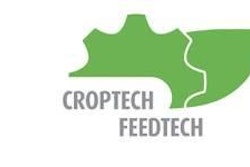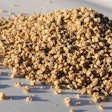A common complaint among broiler growers in areas where in-feed growth-promoting antibiotics have been banned is the reemergence of necrotic enteritis (acute or chronic enterotoxemia) due to failure to control Clostridium perfringens infection. Naturally, a well-targeted program of therapeutic and preventive use of allowed anticoccidials and even coccidial vaccines is the main part of the solution. Nutrition intervention measures, however, can play a significant role, especially in preventing the growth of bacteria and preserving overall gut health. Below is a short list of such measures.
- Wheat . Broiler feeds rich in wheat have been reported to aid the growth and colonization of clostridia. The problem is less severe when wheat is roller milled, as opposed to being hammer milled. The whole issue is most likely related to the presence of high levels of non-starch polysaccharides in wheat that increase digesta viscosity and also serve as a source of nutrients for such bacteria. Adding a suitable enzyme may aid in reducing the impact of these polysaccharides when their level is excessive. Alternatively, reducing wheat inclusion level below 20-30 percent is another option.
- Ingredient changes. With everlasting high prices for most raw materials, nutritionists are pressed hard to change ingredients as often as a less expensive alternative is identified. Although this reduces feed cost, it always brings the risk of unbalancing the established microflora at the gut level. Such an upset might give the edge to certain pathogens, including clostridia, to proliferate and damage the gut epithelium causing necrotic enteritis.
- Low-quality fats. Rancid acids, which are always offered at attractive prices, are known to damage the microvilli structure of the gut epithelium. Again, this allows microbes, such as clostridia, to colonize easier, not to mention the reduced digestive and absorptive capacity of the birds while microvilli remain damaged.
- Mycotoxins. Certain toxins have been reported as being responsible for the destruction of the microvilli, resulting in similar disruptive results as described for rancid acids.
- Low-quality soybeans. Urease destroys the mucus barrier that lines the luminal side of the gut epithelium. Without this barrier, free radicals (from rancid lipids) and toxins (from bacteria and molds) can penetrate the epithelium much easier and damage its cells, plus it allows greater chances for clostridia to colonize the gut.
- Organic acids. Certain organic acids can reduce the growth of pathogenic bacteria and even the growth of mycotoxin-producing molds. Organic acids can be administered through the feed and/or water. A healthy gut microflora will always antagonize much better the pathogenic strains, thus reducing their chances for proliferation and colonization.
- Proteins . It has been reported that in cases of severe necrotic enteritis, removal of fish meal from broiler diets, and/or reduction in dietary protein concentration can be beneficial. This is probably related to depriving bacteria from excess dietary protein that is habitually used for their growth.
It is apparent that nutrition can offer only indirect solutions towards the issue of necrotic enteritis, towards reduced proliferation of clostridia and improved general health status of the gastrointestinal system. Nevertheless, these measures, coupled with strong veterinary intervention, can prevent necrotic enteritis from becoming a major issue in modern broiler production systems.






